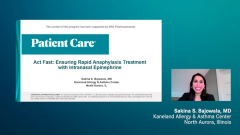
Bridging the Barriers: What is Preventing Patients From Using Epinephrine
A panelist discusses how early epinephrine administration significantly reduces severe complications, prevents progression to life-threatening stages, and decreases the need for additional medical interventions like hospitalization or multiple doses.
Episodes in this series

Importance of Early Epinephrine Administration
Early administration of epinephrine in anaphylaxis significantly reduces the risk of severe reactions and complications while preventing progression to life-threatening stages. Prompt treatment also reduces the need for additional medical interventions such as hospitalization or multiple epinephrine doses. The consequences of delayed epinephrine treatment are substantial and well-documented in medical literature.
Delayed epinephrine administration leads to multiple negative outcomes including persistent abnormal vital signs (heart rate, blood pressure, and respiratory rate). Patients who receive delayed treatment have a five-fold increased likelihood of requiring repeat epinephrine doses and are more likely to need hospitalization rather than being discharged home. Additionally, delayed treatment is associated with increased risk of biphasic anaphylaxis reactions.
Although the overall risk remains low, delayed or deferred epinephrine treatment is associated with an increased risk of fatality. The data clearly demonstrates that prompt epinephrine administration is absolutely critical for optimal patient outcomes, making early recognition and treatment of anaphylaxis symptoms essential for healthcare providers and patients alike.
Newsletter
Enhance your clinical practice with the Patient Care newsletter, offering the latest evidence-based guidelines, diagnostic insights, and treatment strategies for primary care physicians.






























































































































